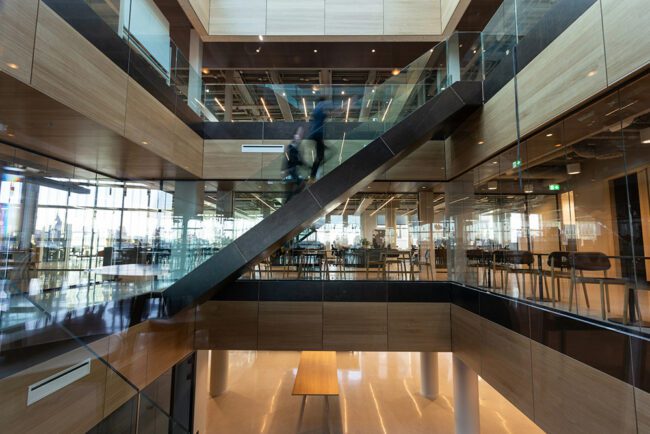Today, we’re going to step right into the heart of facility management. This is where space, people, and processes come together to redefine the modern workplace. Actually, this is where every element is strategically designed to boost productivity.
We’re talking about things such as the layout of the office to the efficiency of its operations. This is exactly what facility management is. This role is multi-dimensional. Without a doubt, it has outdone its conventional boundaries to become a cornerstone of success within organizations. It goes beyond the upkeep of spaces. It involves optimizing these spaces to foster collaboration, creativity, and productivity.
Traditionally focused on coordinating people, space, and processes.
Flash forward to now, and it includes a strategic approach. It covers everything from optimizing space to integrating tech, and sustainable initiatives. Moreover, it incorporates strategies for enhancing employee involvement.
In this article our goal is to provide insights into the developments, advancements, and effective strategies that are revolutionizing this industry. Are you ready to take a trip down the rabbit hole toward a more dynamic and adaptable future? Let’s go!
Exploring the Essential Roles of Facility Management
When it comes to managing facilities, professionals play the role of a conductor (ensuring every note is played perfectly). Traditionally, this role entails a range of responsibilities for maintaining the functionality and harmony of built spaces. Here are some key aspects to consider:
Maintenance Management:
Keeping a facility’s assets in condition is essential for smooth operations. It involves preserving and optimizing the organization’s infrastructure and equipment through upkeep and strategic planning to minimize downtime and extend its lifespan.
From HVAC systems to plumbing electrical networks to integrity, maintenance management serves as a foundation.
Safety and Security:
With evolving challenges ensuring the safety and security of occupants within facilities has become increasingly complex. Facility managers bear responsibility for implementing safety measures, from fire prevention strategies to emergency response plans.
These managers are also responsible for overseeing the setup and upkeep of security systems like access control and surveillance to protect against threats and internal risks creating an environment for both employees and visitors.
Operations Management:
Just like the band Sade once told us, we need a ‘smooth operator’. Smooth operations are the lifeblood of any organization. Facility managers oversee the day-to-day functions of a facility. It doesn’t matter if it’s janitorial services, waste management, space planning, or logistics coordination. These individuals optimize that workflow and streamline processes.
Operations management in facility management extends beyond physical (meaning everything from administrative tasks to budgeting, to vendor management). The focus is on maximizing the value derived from the facility’s resources.
These fundamental functions serve as a foundation. However, with advancements in technology, facility management is experiencing changes that are reshaping how facilities are managed.
Power of Integrated Services in Facilities Management

Integrated Facility Management (IFM) involves combining facility management services within a framework that offers a comprehensive approach to managing facilities beyond traditional boundaries. This integrated approach brings benefits to the forefront.
Here are some of the advantages of integration in the world today for FM:
Efficiency and Cost-effectiveness:
When services are brought together under one management umbrella, organizations can cut out redundancies, streamline processes, and achieve cost savings through economies of scale. In terms, this means saving money and running operations efficiently by allocating resources effectively and executing tasks with precision.
Improved Coordination and Communication:
Integrated facility management encourages coordination and communication among service providers. The goal is to eliminate gaps and overlaps in service delivery ensuring an experience for occupants and stakeholders.
Enhanced Service Quality:
By centralizing service delivery within a management structure, organizations can uphold consistency and quality standards. Whether it’s security, cleaning, or maintenance services, integrated approaches promote a culture of excellence and accountability that drives improvement beyond expectations.
Proactive Issue Resolution:
Through integrated facility management practices, organizations can proactively identify and tackle issues before they become problems.
By dismantling barriers between departments and fostering teamwork, IFM empowers organizations to boost efficiency levels significantly while enhancing effectiveness and resilience in their facility operations.
Primary Duties in Facility Management

Facility managers are responsible for overseeing repairs, ensuring compliance and efficiently supervising staff to maintain facilities. Planning and managing assets plays its part in modern facility management to ensure efficient use of resources and long-term sustainability.
Facility Managers: Keeping You Safe During Disasters
Facility managers play a role in ensuring preparedness for disasters. Their responsibilities include developing and executing strategies to ensure facilities are well-equipped to manage emergencies. They create emergency response plans, provide staff training, and implement measures to mitigate risks and limit disruptions.
Adherence to Safety Regulations and Standards in Facility Management
Facility managers uphold health and safety standards to safeguard the well-being of occupants and reduce liabilities. With a shift towards sustainability and integrating technology into facility management, they are instrumental in adopting eco-practice and utilizing solutions.
The Influence of Technology on Managing Facilities

Technology has transformed the field of facility management by simplifying processes and improving efficiency. Through software tools and automation, routine tasks can be made simple. Resource allocation optimized and real-time insights provided for making informed decisions leading to excellence in facility management.
Transforming Facility Management with Smart Technology
Smart building technologies like energy management systems bring a revolution in facility management by optimizing resource usage and enhancing occupant comfort. Data analytics empowers facility managers to proactively identify issues, forecast maintenance requirements and enhance building performance ushering in an era of facility management.
Utilizing IoT for Managing Facilities
The use of devices is vital in overseeing and improving facility operations by providing real-time insights into equipment performance, occupancy rates, and environmental conditions. Through the application of technology facility managers can boost efficiency, cut down on expenses, and enhance the operational efficiency of facilities.
The Increasing Significance of Energy Conservation
Energy management systems contribute to cost-effectiveness and sustainability in facilities by optimizing energy usage and minimizing wastage. Facility managers are crucial in implementing energy-saving practices and leveraging technologies like IoT and AI to optimize energy consumption while reducing impact.
The Evolving Role of Facility Operations in Driving Organizational Success
Facility operations now play a role in advancing objectives by creating conducive environments that promote productivity, collaboration, and employee wellness. Facility managers align facility operations with business goals to ensure that facilities act as catalysts for achievement.
Strategic Facility Management for Business Expansion
Facility managers strategically plan business objectives to foster growth. By integrating facility operations into the structure, they set the stage for sustainable and scalable business models that pave the way for long-term success.
Incorporating these approaches does not boost business expansion. It also supports a more eco-conscious mindset aligning with the company’s commitment to social responsibility. An FM can do this by:
- Utilizing data-driven insights: This helps optimize space and improve productivity in the workplace.
- Introducing energy-saving programs: These efforts aim to lower expenses and minimize environmental impact.
- Promoting a culture of enhancement: This involves integrating feedback loops and performance metrics into facility management practices.
Facility managers play a role in setting the stage for growth and prosperity. This mirrors corporate values while fostering efficiency and creativity.
Sustainable Methods in Facility Management
Integrating methods into facility management drives long-term business achievement. It also aligns with the corporate values of environmental stewardship. Adhering to practices in facility maintenance management can further boost sustainability endeavors while enhancing efficiency. This includes actions like:
- Adopting cleaning products and techniques.
- Implementing energy sources. Reducing carbon emissions.
- Involving stakeholders in sustainability initiatives through education and awareness campaigns.
When sustainability takes precedence, organizations nurture a culture of accountability and ingenuity that resonates throughout the organization.
Top Strategies for Effective Facility Maintenance Management in the Modern Age
In today’s fast-paced world, staying ahead with maintenance management is crucial to ensure smooth operations of facilities. The implementation of maintenance technology and eco-friendly cleaning practices showcases their impact on the facilities management industry. Take a look at the strategies to embrace the modern age below:
- Embrace predictive. IoT sensors to predict equipment failures and plan maintenance activities in advance.
- Incorporate remote monitoring technologies to reduce downtime and enhance maintenance schedules.
- Collaborate with eco suppliers and service providers to promote practices.
These approaches can streamline efficiency. Set the stage for a greener, more resilient future in facility management.
Innovative Maintenance Approaches
The integration of maintenance techniques and friendly cleaning methods underscores the sector’s dedication to efficiency and sustainability.
Let’s now turn our attention towards integrating eco-technology into facility upkeep efforts. These advancements are reshaping the landscape of facility management by fostering enhancements in procedures. Here are some key strategies to consider:
- Discover advancements in energy systems such as panels and geothermal heating.
- Integrate building solutions for automating maintenance duties and enhancing energy efficiency.
- Support training initiatives to equip facility management teams with the skills to utilize maintenance tactics effectively.
By adopting these approaches, companies specializing in facility management can enhance productivity and eco-friendliness positioning themselves as leaders in the facilities management industry.
Final Word
As we wrap up our talk on the impact of facility management practices, one thing is clear. The industry is moving towards a future centered on innovation, sustainability, and efficiency. If we choose to grab hold of the principles of FM, businesses will drive growth and promote environmental stewardship and operational excellence. Leading the way in this exciting field are companies such as Gaia Digits.
At Gaia Digits, we’ve got solutions that truly transform how facilities are overseen and enhanced.
Through the Gaia Workspace, organizations can leverage technology to boost efficiency, streamline processes, and create workspaces tailored to the needs of today’s workforce. Collaborating with Gaia Digits enables facilities to unlock productivity, teamwork, and eco-friendliness, heralding an era of top-notch facility management.
